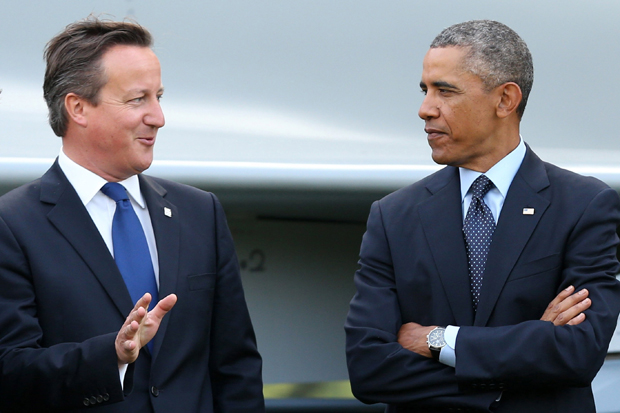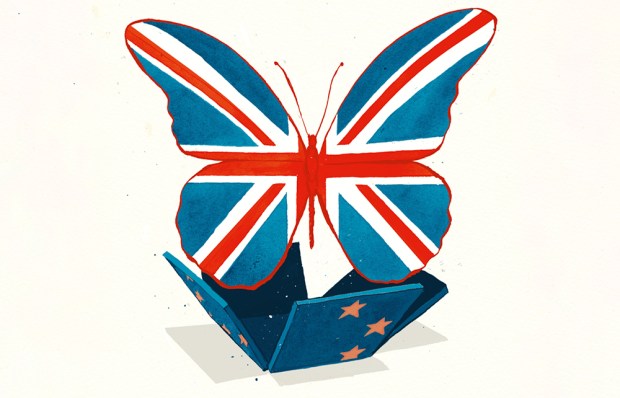Britain is forfeiting its position on the world stage. With no national debate, we are surrendering our claim to be a major player in international affairs and undermining the Atlantic alliance that has kept Britain and Europe secure for 65 years. In these circumstances, it is easy to understand why Barack Obama has felt obliged to warn David Cameron of the damage he would be doing to the special relationship and to Nato if he failed to commit Britain to spending the bare minimum on defence.
The Prime Minister has given several spending pledges — on education, health and overseas aid — so his silence on defence speaks volumes. It fits a trend: European defence spending has fallen by 8 per cent over the last six years despite threats to it increasing dramatically in that period, with the rise of Islamic State and the rise of Russian revanchism. Is it any wonder that the Americans, who find themselves contributing almost 70 per cent of Nato spending, are becoming fed up? What was intended as an Atlantic alliance is becoming a defence welfare state: Uncle Sam pays, European countries benefit.
With the honourable exception of Northern Ireland’s Democratic Unionist Party, no party wants to talk about defence spending in this election campaign. As Air Chief Marshal Sir Michael Graydon and Vice Admiral Sir Jeremy Blackham argue in a Spectator article published online, there has been plenty of talk of ‘weaponising’ the NHS, but the public service which really needs weapons is being steadily divested. Since 2010, the overall fighting power of the military has been reduced by half. Britain no longer has any maritime patrol aircraft, we have just three squadrons of Tornados to defend the country, and the army is suffering a serious manpower shortage.
The cuts have hardly begun. A strategic defence and security review this year will almost certainly lead to further reductions in firepower, because whoever wins the election will be forced to reduce the deficit and will hit upon defence as the target which will provoke the least public protest. Observers of defence policy believe that within three years UK defence spending could fall as low as 1.7 per cent of GDP — lower than the 2 per cent minimum set by Nato for its -members.
The main parties feel that they can get away with cuts to military spending because the public is weary of what many see as unnecessary wars in Iraq and Afghanistan. Yet this assumes that the importance of national security is akin to that of fighting wars against insurgents in the Middle East. It is not.
Moreover, the military is being cut back at a time of heightened need for self-defence. On several occasions over the past few months, Russian aircraft have been sent to test western European air defences, a display of military brinkmanship not seen since the Cold War. Vladimir Putin has already seized Crimea and is sponsoring separatist forces in Ukraine. Twenty-five years ago, it was fashionable to speak of the Cold War bringing a ‘peace dividend’ — switching money from military to public services. Cold War-style hostilities are returning, but the armed forces are still being cut.
It is difficult to tell exactly what David Cameron believes about foreign policy and defence. His premiership has been punctuated by rallying cries, followed by inaction. Last June, when Isis was beginning to threaten Iraq, David Cameron spoke of his will to ‘close down ungoverned spaces’ in the -Sahara. The Prime Minister and Chancellor are not wholly ignorant of the region — George Osborne travelled there during his gap year — but given that our military could not win in Basra or Afghanistan, Cameron is unlikely to be closing down anything other than RAF bases.
Cameron also led the calls for bombing raids to help rebels overthrow the Gaddafi regime — which proved successful in that limited purpose — but then left Libya alone to become one of those ‘ungoverned spaces’. As democracy failed to take hold, arsenals of Gaddafi’s weapons were abandoned for the taking. As Libya’s former prime minister Ali Zaidan warned this week, Isis may be only a couple of months away from extending its caliphate to the country. Cameron rattled his sabre against the Assad regime in Syria; then, having failed to win parliamentary approval, went quiet until, like Orwell’s Oceania, he proposed fighting Assad’s enemies instead. There is no decipherable strategy.
It is not as if the Prime Minister has excelled in exercising soft power, either. This week, Angela Merkel and François Hollande will be meeting Putin and the Ukrainian government. Cameron will not be there. Nor will he follow Barack Obama in considering arming the Ukrainian government. Britain has become a non-player in the crisis.
Over the next few months we will hear endless promises on the NHS and schools, whose budgets have been ring-fenced, yet nothing on defence. If the main parties have an unspoken consensus to turn Britain into Denmark, a country which prides itself on public services, but with little in the way of armed forces or international influence, we should know about it.
Got something to add? Join the discussion and comment below.
Get 10 issues for just $10
Subscribe to The Spectator Australia today for the next 10 magazine issues, plus full online access, for just $10.
You might disagree with half of it, but you’ll enjoy reading all of it. Try your first month for free, then just $2 a week for the remainder of your first year.














Comments
Don't miss out
Join the conversation with other Spectator Australia readers. Subscribe to leave a comment.
SUBSCRIBEAlready a subscriber? Log in